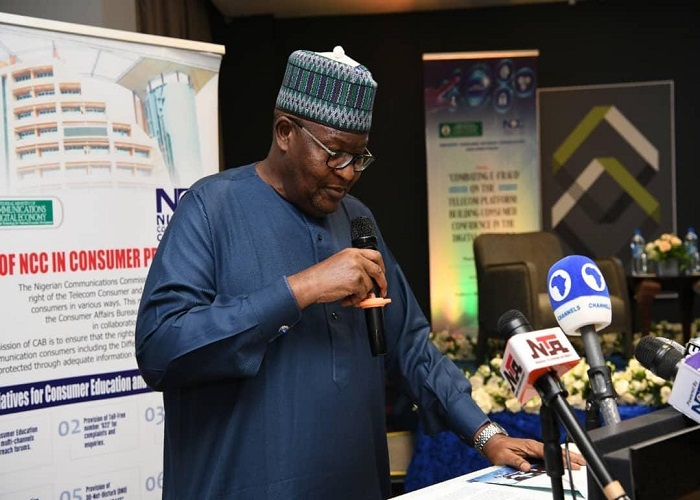Executive Vice Chairman of the Nigerian Communications Commission (NCC), Prof. Umar Garba Danbatta has suggested ways by which telecom service providers can create a safer digital ecosystem that could inspire trust and enable the full potential of the digital economy.
Danbatta, who made this suggestion in his keynote address at the 2nd Quarter 2023 Industry Consumer Advisory Forum (ICAF) Meeting (Open Forum) held in Lagos, on Thursday, June 22, 2023, said that investing in robust security infrastructure, implementing stringent protocols, promoting awareness, and fostering innovation, can create a safer digital ecosystem.
Speaking on the theme, ‘Combating E-Fraud On Telecom Platforms And Building Consumer Confidence In The Digital Economy’, Danbatta said as the country navigates the ever-evolving landscape of technology, the need to address the growing concern of fraudulent activities in the digital realm and take proactive measures to safeguard the trust and confidence of consumers, is very important.
He said that though the telecom sector plays a pivotal role in enabling digital transformation, providing the infrastructure and connectivity that fuel citizens’ interconnected world, these advancements come with new challenges, one of which is the rising tide of e-fraud and cybersecurity concerns.
“E-fraud encompasses a wide range of malicious activities carried out via electronic means, including identity theft, phishing, hacking, and unauthorized access to personal and financial information, with the intention to defraud or take advantage of victims,” Danbatta noted, adding that these criminal activities may not only cause significant financial losses but also erode consumer trust in the digital ecosystem.
Admitting that the NCC as a regulator of the communications sector has a crucial role to play in combatting e-fraud, it must establish comprehensive legal frameworks and standards that mandate sound security practices for telecom operators, noting that the legal framework must focus on data protection, privacy, and incident response, ensuring that operators are held accountable for any lapses in security on their respective networks.
“The NCC also type-approves communications equipment to ensure that they conform to global standards and are interoperable with various relevant technologies. In this regard, the Commission collaborates with Mobile Network Operators to ensure the safety of their networks and conducts regular audits and assessments to verify compliance and encourage a culture of cybersecurity within the industry,” he said.
Danbatta further stated that in accordance with the Nigerian Communications Act 2003, telecom operators have a responsibility to ensure the security and integrity of their networks and to prevent it from being used in, or in relation to, the commission of any offence under any law in operation in Nigeria.
“With the increasing uptake of digital financial services and the advent of disruptive technologies, the issue of cybersecurity has become increasingly important. Telecom operators must, therefore, invest in robust infrastructure, employ state-of-the-art security measures, and conduct regular audits to identify vulnerabilities and address them promptly,” he added.
While warning operators to implement stringent authentication protocols, two-factor authentication, and encryption mechanisms to safeguard customer data and prevent unauthorized access, Danbatta expressed concern about how personal data is collected, stored, shared, and exploited.
He disclosed that NDEPS 2020-2030 adequately addresses the protection of telecom consumers against the threats of cybercrime, encouraging them to embrace digital finance and supporting them to contribute to the Digital Economy.
“Pillar No. 6 of the NDEPS, which deals with soft infrastructure, has proven to be proactive. The soft infrastructure pillar focuses on strengthening public confidence in the use of digital technologies and participation in the Digital Economy. The pillar will address the importance of cybersecurity and other standards, frameworks, and guidelines that encourage citizens to embrace a digital culture,” he said.
Danbatta stated that data privacy and the deployment of technologies like the public key infrastructure are addressed in this pillar and added that the recently signed Nigeria Data Protection Act 2023 is to provide a legal framework for the protection of personal information and the regulation of how personal information is processed, among other things.
He disclosed that the NCC is also in the process of developing more elaborate Data Protection Regulations to ensure the protection and privacy of data in the Nigerian communications sector, noting that it is important to mention that the Commission has issued the Consumer Code of Practice Regulations 2007 which among other things, provides for the protection of consumer information.

